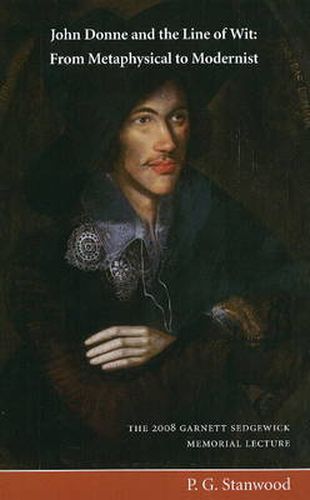Readings Newsletter
Become a Readings Member to make your shopping experience even easier.
Sign in or sign up for free!
You’re not far away from qualifying for FREE standard shipping within Australia
You’ve qualified for FREE standard shipping within Australia
The cart is loading…






This is a study of influence, adaptation, and historical imitation and invention. In his own time, Donne was celebrated for his distinctive style, especially for what his contemporaries recognized as strong lines , that is, witty conceits or unusual, often unexpected and surprising comparisons. His imitators seldom managed to write with similar success. Donne’s metaphysical wit fell out of fashion in the later seventeenth century, not to be significantly explored and revived until the early twentieth century, and then notably by the modernist movement in the years that followed Eliot’s Waste Land (1922). Among the most important and earliest of poets and critics to respond to this movement are the self-styled Fugitives of the southern United States. As fugitives they stood against what seemed old and shop-worn language, and they gave their name and talent to the literary journal published at Vanderbilt University from 1922–25: The Fugitive provided an outlet for the work of John Crowe Ransom, Robert Penn Warren, Allen Tate, and others, who discovered a new modernism that might be shaped out of the old metaphysical mode of Donne.
$9.00 standard shipping within Australia
FREE standard shipping within Australia for orders over $100.00
Express & International shipping calculated at checkout
This is a study of influence, adaptation, and historical imitation and invention. In his own time, Donne was celebrated for his distinctive style, especially for what his contemporaries recognized as strong lines , that is, witty conceits or unusual, often unexpected and surprising comparisons. His imitators seldom managed to write with similar success. Donne’s metaphysical wit fell out of fashion in the later seventeenth century, not to be significantly explored and revived until the early twentieth century, and then notably by the modernist movement in the years that followed Eliot’s Waste Land (1922). Among the most important and earliest of poets and critics to respond to this movement are the self-styled Fugitives of the southern United States. As fugitives they stood against what seemed old and shop-worn language, and they gave their name and talent to the literary journal published at Vanderbilt University from 1922–25: The Fugitive provided an outlet for the work of John Crowe Ransom, Robert Penn Warren, Allen Tate, and others, who discovered a new modernism that might be shaped out of the old metaphysical mode of Donne.